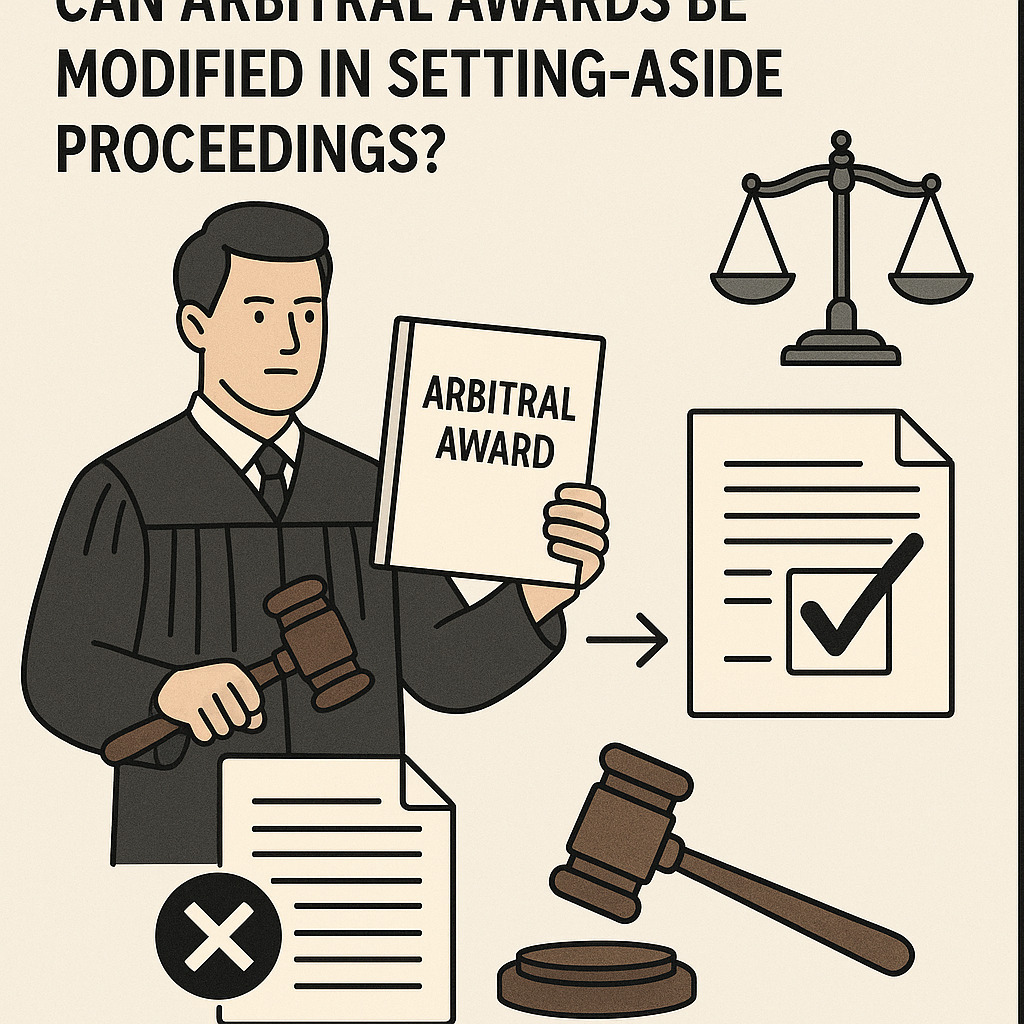View News
Can-Arbitral-Awards-Be-Modified-In-Setting-Aside-Proceedings

Can Arbitral Awards Be Modified In Setting-Aside Proceedings?
Introducton
There has been much discussion and judicial examination surrounding the issue of whether a judge can alter an arbitral award while setting it aside. The position has historically inclined toward a narrow scope of court involvement, largely focusing on setting aside the judgment rather than changing it, especially under the Indian Arbitration and Conciliation Act, 1996 (the "Act").
The Traditional View: Setting Aside, Not Modification
According to the traditional reading of Section 34 of the Act, which addresses the annulment of arbitral awards, the court's authority was limited to either sustaining the award or annulling it in the event that certain conditions were satisfied. These arguments usually have to do with the arbitration agreement's legality, the arbitral tribunal's makeup, the process that was used, the award's extent, and public policy.
This opinion was supported by a number of court rulings that said that the Act does not specifically give judges the authority to change or alter an arbitral award. Without getting into the specifics of the disagreement or the validity of the judgment, the focus was on the courts' oversight function to guarantee justice and conformity to the law.
A Shift Towards Limited Modification
But recent events and court rulings—most notably a landmark decision rendered by the Supreme Court of India's five-judge Constitution Bench in May 2025—indicate a subtle shift in favor of acknowledging a restricted power of modification in specific situations during setting-aside proceedings.
According to the Constitution Bench's majority opinion, even while Section 34 mainly allows for the setting aside of awards, the authority to partially set aside an award also entails the authority to amend it, particularly in cases where the defective element of the award can be separated from the legitimate part. The reasoning is based on the idea that the smaller power—to set aside partially, which can be equivalent to modification—is included in the bigger power—to set aside completely.
Grounds for Limited Modification
The Supreme Court has clarified that this power of modification is not akin to an appellate review on merits but is restricted to specific scenarios:
Severance of Invalid Portions Severance of Invalid Portions: If an arbitral award includes rulings on subjects outside the purview of the arbitration submission and these rulings can be separated from the subjects covered by the arbitration, the court may invalidate only the invalid portion of the award, thereby changing the award to preserve the valid portions.
Rectification of Errors: The ability of courts to correct "computational, clerical, or typographical errors, as well as other manifest errors" in an arbitral ruling is an inherent feature of the system. This is comparable to the authority granted by Section 152 of the 1908 Code of Civil Procedure to rectify inadvertent errors or omissions.
Post-Award Interest: In order to avoid annulling an entire award because of an incorrect rate of interest, the court may alter the post-award interest if the facts and circumstances warrant it.
Constitutional Powers (Article 142): Under Article 142 of the Indian Constitution, the Supreme Court may employ its extraordinary authority to amend awards in order to provide "complete justice," but this authority must be exercised carefully and sparingly.
The Dissenting View
Notably, a dissenting view within the Constitution Bench contended that the Act does not grant the courts a universal power of modification and that the authority to partially set aside is separate from the authority to modify. This point of view holds that the court's authority should be restricted to reimbursement or setting aside.
Conclusion
In conclusion, the legal landscape is changing to acknowledge a limited capacity of modification, even though the annulment of the arbitral judgment is still the major remedy in setting-aside procedures. This authority is typically used to fix obvious mistakes, in certain situations involving post-award interest, and when the invalid portions of an award are severable. Under Article 142, the Supreme Court also has the unusual authority to change awards for the sake of full justice.
The degree to which arbitral awards can be changed during setting-aside proceedings will be further shaped by the courts' continued interpretation and application of these principles, which will strike a balance between the necessity of ensuring fair and efficient dispute resolution and the requirement for little judicial intervention.
"Unlock the Potential of Legal Expertise with LegalMantra.net - Your Trusted Legal Consultancy Partner”
Disclaimer: Every effort has been made to avoid errors or omissions in this material in spite of this, errors may creep in. Any mistake, error or discrepancy noted may be brought to our notice which shall be taken care of in the next edition In no event the author shall be liable for any direct indirect, special or incidental damage resulting from or arising out of or in connection with the use of this information Many sources have been considered including Newspapers, Journals, Bare Acts, Case Materials , Charted Secretary, Research Papers etc
Prerna Yadav
LegalMantra.net Team

